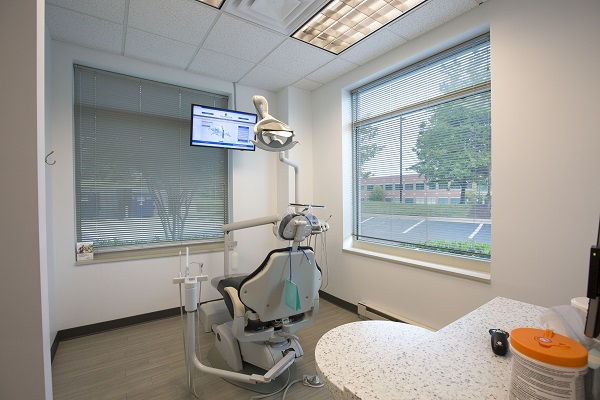When a General Dentist May Recommend a Deep Dental Cleaning

Wondering why a general dentist may recommend a deep dental cleaning? Read on to learn more. A general dentist may recommend a deep dental cleaning if the patient shows signs of a severe form of gum disease known as periodontitis. This condition can put the long-term health of the gums and jawbone in jeopardy and increase the risk of tooth loss. Deep dental cleanings can improve periodontal health and reduce the risk of severe complications.
The purpose of deep dental cleanings as explained by a general dentist
The following is a detailed look at what a deep dental cleaning is and why a general dentist may recommend it for a patient.
What is a deep dental cleaning?
A deep dental cleaning (also called scaling and root planing) is a relatively common general dentistry procedure that involves cleaning beneath the gum line to remove plaque, tartar, and bacteria that are contributing to the onset of periodontitis symptoms. The primary difference between a deep dental cleaning and a routine dental cleaning is that a deep dental cleaning involves cleaning below the gumline, whereas a routine cleaning cleans the surface of teeth and along the gumline.
What takes place during a deep dental cleaning?
Before the procedure, the dentist and their staff may perform dental x-rays and an oral examination to gather more information about the patient’s oral health and the severity of their periodontitis. Specifically, they also measure the depths of the gums, which is one of the primary methods of determining the severity of periodontitis. The preliminary stages also offer an opportunity to learn what areas of the gums they should focus on the most. They may also review and discuss medical and dental history as well.
The first step in a deep dental cleaning procedure is known as scaling. This involves scraping away plaque and tartar build-up on the surface of teeth, along the gum line, and underneath the gums (along the surface of the tooth roots). The next step is known as root planing. This process involves smoothing the tooth’s surfaces to reduce the risk of bacteria accumulation. This also helps the gums to reattach properly around teeth as well.
After the procedure, the dentist can provide aftercare instructions, which should include keeping the mouth as clean as possible for the first 24 hours and avoiding hard or sugar-filled foods and beverages.
When is a deep dental cleaning recommended by a general dentist?
There are two main types of gum disease: gingivitis and periodontitis. As mentioned, a deep dental cleaning is performed to treat periodontitis, the more severe form of gum disease. Treatment is often recommended to help prevent the symptoms from causing more severe concerns such as increased bone loss in the jaw and the loss of teeth.
What are the symptoms of periodontitis?
The symptoms of periodontitis include gums that bleed while brushing, swollen gums, bad breath, gum recession, deep gum pockets, bone loss in the jaw, and loose teeth, among other possible symptoms. If any concerns with the gums develop, then a visit with a general dentist is encouraged to determine if a deep dental cleaning or another form of treatment is recommended.
If left untreated, the symptoms of periodontitis may worsen and can lead to the loss of one or more teeth and the need for a more extensive tooth-replacement process that includes a bone graft procedure. On the other hand, treatment for periodontitis in the earlier stages allows for the reversal of many of the symptoms and the ability to avoid teeth loss.
What causes periodontitis?
Some patients are more susceptible to periodontitis due to certain medical conditions and hereditary factors. However, the most common causes of periodontitis are poor oral hygiene, a diet that is high in sugar and other carbohydrates, or a combination of the two. Infrequent visits to the general dentist for a check-up and cleaning can also increase the risk of periodontitis. Patients can reduce their risk of needing a deep dental cleaning by brushing and flossing regularly, using mouthwash as recommended by their general dentist, and receiving regular professional routine cleanings.
Do you need a deep dental cleaning?
Are you experiencing symptoms of gum disease or have gone more than six months since your last check-up visit? If so, then we encourage you to give us a call and schedule a convenient time to meet with us for a check-up. We can assess the condition of your oral health and answer any questions you may have.
Request an appointment here: https://www.titandentalcare.com or call Titan Dental Care at (703) 344-9904 for an appointment in our Sterling office.
Check out what others are saying about our dental services on Yelp: General Dentist in Sterling, VA.
Related Posts
Choosing a general dentist to straighten your teeth is a great idea. General dentists are primary care dental providers, which means they understand everything there is to know about diagnosing, treating, and managing their patients' oral health. This type of dentist is the first dentist you would make an appointment with when experiencing any dental…
General dentistry consists of a lot of routine oral health care, which also happens to include restoring teeth that are in bad shape due to damage. Common damage may include cracks, chips, or cavities, all of which can be addressed with the help of different dental restorations. Continue reading to find out what dental restoration…
One of the most common dental procedures that general dentists offer is a dental bridge. This is a method of teeth replacement that replaces one missing tooth or a section of missing teeth. A dental bridge most notably addresses a cosmetic concern, but it may offer functional and oral health benefits as well. It is helpful…
Have you ever suffered from an injury that left your teeth in pain? How do you know if you have an injured tooth? How can it be fixed? An injured tooth doesn’t have to be the end of the world, even though there are some instances where it can be fatal. Keep your teeth healthy…


